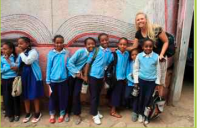Tag: Elementary
Elementary Curriculum – Language
The elementary reading curriculum is designed to incorporate phonics, whole word and phonetic exceptions. Lower elementary students progress through a leveled reading program using the Pink, Blue and Green Montessori reading exercises while additional materials and experiences allow them to perfect their reading skills, develop their fluency and comprehension. The Grammar and Vocabulary materials allow the students to assimilate an understanding of the structural rules that govern the English language. Literary elements are explored during Group Literature. Lower and upper elementary students practice writing on a daily basis in classroom journals that cover a variety of writing forms. In lower elementary, Writer’s Workshops are held throughout the year to target specific writing skills. In upper elementary the different varieties of writing and writing skills are integrated into their cultural, science and literature studies. Our goal is to help the students become comfortable using writing as a communication skill. Students learn to think clearly, to research, and to express themselves with confidence and clarity in writing and speech.
| Lower Elementary | Upper Elementary | |
| Reading | Reading readiness, phonic skills, guided reading, sight words, contextual clues, S.S.R. (Silent Sustained Reading), vocabulary | Shared reading, dictionary skills, fluency, expression |
| Comprehension | Responding to questions regarding Story-time book (sequencing events, recapping & summarizing, identification of character, plot & setting) context clues & main ideas | Continued study of main ideas, sequencing & context clues, assumptions/inferences, following written directions & instructions |
| Penmanship | Metal inset exercises, D’Nelian print & cursive, spacing, left justification, neatness | Mastery of cursive |
| Spelling | Unconventional to conventional, leveled spelling works | Conventional spelling lists, spelling demons, vocabulary, spelling rules |
| Mechanics | Ending punctuation, capitalization, commas | Apostrophes, commas, quotation marks |
| Composition | Complete sentences, journaling, picture prompted stories, modeled writing, editing | Journaling, character & plot development, proofreading, revising, publishing |
| Study Skills | Categorizing, table of contents, index, beginning reports | Outlining, note taking, organizing information, skimming, advanced reports, paraphrasing |
| Grammar | Parts of speech, parsing | Sentence analysis, verb tenses |
| Speaking | Poetry presentations, in-class reports, drama, story-telling | Poetry presentations, in-class reports, drama, story-telling |
Elementary Curriculum – Mathematics
The elementary Montessori math curriculum takes the students through a series of precise exercises using specifically designed materials that support the students’ emergent abilities to abstract. Using hands-on manipulative materials the students in 1st – 3rd grade are given tools by which to do their math work and so acquire a concrete understanding of math skills and knowledge. This solid foundation allows a smooth transition to abstract understanding and application of math skills during the 4th – 6th grades.
| Lower Elementary | Upper Elementary | |
| Numbers | Linear counting, sequencing, place value through millions, before & after numbers, <, =, or >, skip counting, ordinal & Roman numbers, one-step word problems, patterns & relationships | Factors & multiples, rounding numbers to nearest 10s & 100s, prime numbers, squaring and cubing, estimating, multiple-step word problems |
| Operations | + – x / of whole numbers, regrouping, missing values, inverse operations, memorization of numerical patterns | Large operations in all 4 operations (including long division, multi digit multipliers), operations involving decimals, memorization of tables, percentages, averages |
| Functions | Identification of fractions, addition & subtraction with common denominators, multiplication & division of fractions by whole numbers, equivalencies | Mixed numbers, + and – of fractions with unlike denominators, simplifying fractions |
| Measurement | Standard and metric units of measurement for length, mass & volume | Perimeter, area, capacity, word problems |
| Time | Telling time to the minute | Elapsed time, 24 hour clock, word problems involving time |
| Statistics | Interpreting data, block and bar graphs | Line graphs |
| Geometry | Classification of solids, quadrilaterals, triangles and polygons, study of lines & triangles | Study of circles, congruency & symmetry, use of protractor and compass |
| Money | Coin value, totaling amounts | Making change, word problems involving money |
The Elementary Curriculum Overview
Different from a traditional school setting where teacher-directed curricula determines the daily lessons, the Elementary Montessori students choose their own work. Under the guidance of the teachers, the Montessori students select activities that reflect their ability levels yet present opportunities to practice and perfect skills. Students and teachers work together for large blocks of uninterrupted time within a classroom that is rich in resources. The students work at their own pace while the Montessori teachers observe and facilitate the learning process. The curriculum’s goal is to encourage students to become active learners rather than passive participants in education.
The elementary Montessori curriculum is designed to meet the needs of students between the ages of six and twelve. Elementary students have an increasing ability to abstract and to imagine; the curriculum engages the students in activities that utilize these affinities. While the curriculum builds upon the student’s early childhood classroom practice, it expands to include experiences, opportunities and instruction that are appropriate for the students’ developing minds. The Montessori materials continue to play an important role as the students transition from the concrete to the abstract. The teachers’ lessons involve exploration, research and hands-on experiences that guide the students in developing their reasoning minds.
Elementary studies include geography, biology, history, language, mathematics, science, music, movement and art. Studies are enriched through field trips, visitors and workshops that support the curriculum and expand the learning outside of the classroom into the community.
Becoming a Montessori Parent by Edward Fidellow
Becoming a Montessori Parent
by Edward Fidellow

This Montessori parent, and school administrator, joins her three Montessori children on a field trip this fall.
There are seven simple steps to becoming a Montessori parent. When we say simple we don’t mean that they are not challenging. It is a lot like the definition of bull riding. “The object is to keep the bull between you and the ground.” Simple – but challenging.
The first step to becoming a Montessori parent took place when you enrolled your child in a Montessori program. That in itself is a challenge. Most of us weren’t raised in a Montessori school. The whole concept is foreign and takes a bit of courage to step out of the norm and our comfort zone. We may have chosen the program because it wasn’t like our school experience (which is why we chose it.) Or we chose it because we saw something unique in a Montessori child we knew. Or we were just plain lucky and stumbled on to a Montessori school and were fascinated by what we saw. Even then we had to deal with the question, “If this is so great, how come the whole world isn’t lined up outside the door to enroll?” (Which is the same question Montessorians keep wondering about too!) But you made a complex and challenging decision to become a Montessori parent. And here you are. So how do you get the best out of your decision? You go to step two.
You begin to understand the core philosophy of what Montessori is all about. Fortunately, you don’t have to become a Montessori teacher to be a good Montessori parent. (You don’t have to know how to manipulate all of those materials and you don’t have to keep fifteen children from climbing the walls.) The most significant Montessori concept is to respect the child. I can almost hear the wheels turning “Of course I respect my child, I love them very much that’s why I have them in Montessori, I want the best for them.” Of course you love them – but respect is different. Respecting the child is first, to respect the nature of children. Children are not mini adults waiting to be molded. They are like tadpoles and caterpillars that have their own form and function of life waiting to become what they are intended to be. We are often impatient for them to become because we don’t realize that childhood – with its curiosity, playfulness, messiness and all – is part of the process of them transforming themselves into the adults they will become. We have to respect that process – which doesn’t mean they always get to do what they want. One of the operative words in Dr. Montessori’s writing is the word “train”. We do need to train our children but we need to train ourselves “not to destroy that which is good” in the nature of our children. The second part of respect is to respect the personality of your child. Your child is not a blank slate. They are already imbued with the unique characteristics of who they are. The artistic bent is already there. The math bent is already formed. The leader, the follower, the giver, the taker, the extrovert, the introvert are already dna’d into your child. Right or left handed, right or left brained are already formed.
So how do you cooperate with nature? You become an observer. That is the next step in becoming a Montessori parent – you train yourself to observe. What does your child gravitate to? What gives them great joy? What occupies them endlessly? These are all clues to who your child is becoming. You are fortunate that you have a trained helper in your child’s Montessori teacher. Your next parent conference should ask more than what has she done but who do you see her becoming. It is hard to cooperate with nature if you are not aware of the nature of your child.
Our third step is to become their champion. I know. I hear you say, “Of course, I’m their champion. I love them.” And so you do. But are their goals your goals? Translation: Do you have goals for them that do not take into account who they are. (There are many jock fathers who do not have jock sons.) Yes, you have many wonderful goals for them to be caring and loving, honest and faithful, upright, truthful, etc – and these are worthy, significant and meaningful goals which they should attain to. But the expression of their lives – career, vocation, work – is best met and fulfilled according to their gifts. When your five year old says, “I want to be a fireman.” He may be reflecting the latest book or television program he’s seen. However, if you continue to ask the why questions, “Why do you think that would be a good job? Why do you think that you would enjoy that?” you may discover that your child is not drawn just to the excitement but to the fact of wanting to help people or he likes the aspect of being part of a team. All are important clues to his personality. Your child needs you to champion and encourage his personality (especially, if it is different than yours.)
The fourth step is to practice what they learn at school – grace and courtesy. Please and thank you, may I, excuse me, please forgive me and a host of other considerations practiced (and modeled) at home will go a long way to giving your child every advantage in life. People respond favorably to a child with great manners.
Fifth, practice independence. Independence is the ability to be self-governing and that comes from making choices, living with the consequences and having responsibilities. As often as possible give your children choices. “What do you want for breakfast, cereal or eggs?” “Do you want two spoonfuls of carrots or one?” (Don’t offer choices where there are no choices. “Do you want carrots? They say no and you serve them anyway.) Give your children chores they can accomplish – making their beds, putting dirty clothes in the laundry, dishes in the dishwasher, etc. Chores build responsibility; responsibility builds independence; independence builds confidence.
Sixth, give them the gift of time. Give them time to accomplish their chores. Give them time to be children. Give them time to breath. Give them your time.
Seventh, practice humility. They have a lot to learn from you. What is easy for you as an adult is mystifying and beyond challenge for them. Let your words be seasoned with grace. Look for the good in what they do. Their motives are often pure; their actions imperfect. Yet, we have a lot to learn from them also. And when you are wrong (when, not if) practice the humility of saying, “Please forgive me.” It will not destroy your authority or their respect for you. It will teach them one of the great lessons of life – when you fail, whether it’s in a relationship, school, career or life – own the failure and start over again – to succeed another day.
Becoming a Montessori parent is to become the best parent you can be.
Children of Ethiopia Education Fund
The Children of Ethiopia Education Fund, or COEEF, is a Utah-based organization that provides crucial access to materials, uniforms and an absolutely vital private education to many children in Ethiopia. Fiercely dedicated to the protection and instruction of young girls, COEEF provides a new kind of life in an otherwise perilous, sexist, underprivileged and poverty-driven region of the world. We share the mission of this organization as we mark our 6th year of support to such a pivotal duty of the world’s edification. COEEF takes its place in the school within our Service Learning Program, a program designed to give our students a channel to ignite character, build trust and connect with others through acts of true service.

COEEF was created by a local SLC couple: Norm and Ruthann Perdue, when they traveled to the country with a humanitarian mission. During their service, they learned of the great educational disparity in the upbringing of an Ethiopian child: with classrooms crowded, unfinished and ill-prepared. At the time, less than half of all Ethiopian citizens were able to read, and only half of all Ethiopian children had the opportunity to attend school. The two saw an immediate need for assistance, and they began working on a plan to improve these conditions.
While in Ethiopia, they learned of a child, 12 year old Kidest, whose father had died and whose mother had abandoned her shortly after, unable to manage under the strain of raising her alone. Kidest had been adopted by her grandmother, who managed to send her to a private school, the “Ethiopian Adventist College” with the mere wage that was paid to a hard-labor employee of the school. When Ruthann and Norm became aware of this situation, they connected with Kidest’s grandmother and found her bereft in her struggle to finance her granddaughter’s education. In her old age, she suffered physical fatigue, and she expressed that she did not know how much longer she could go on working to support Kidest in her pursuit of higher education.
This sadness would soon turn to joy, as after hearing her story, Norm and Ruthann decided that they would share some of the burden. They made a request to the school and discovered that for a donation of two-hundred dollars, they would be able to finance the girl’s yearly tuition, supplies and school uniform. This act of generosity would make them the first sponsors of the Children of Ethiopia Education Fund. When they returned to their home in Salt Lake City, they shared their story with everyone who would listen; and by 2001, they had convinced enough of their associates to become involved that they would return to Ethiopia to enroll 30 children in private education institutions. Shortly following this exceptional milestone, COEEF appointed a board of directors and was officially incorporated as a non-profit organization.

Participation and arranged donations in support of the COEEF service program are available to all MCS parents, students and volunteers. Our school is responsible for the education of 7 young girls and we seek to make the greatest contribution we are able to this established purpose. By raising money during our Annual Spring FunRun, our students help us finance this commitment, and everyone is able to share in the excitement of giving an immeasurable gift.
It is said, “Educate a woman and you will educate a nation.” We are proud to be continued sponsors of COEEF and we intend to remain loyal in our stewardship.
* At this time, COEEF is collecting school supplies materials for the children they support in Ethiopia. If you or your child are interested in donating to this season’s care package, please drop off your donation at our front office and their delivery will be arranged to COEEF headquarters before humanitarian representatives travel to Ethiopia in early October. If you are interested in making a personal donation to COEEF, or becoming a child’s sponsor, we recognize you and invite you to visit the COEEF website to arrange for your own stewardship.
